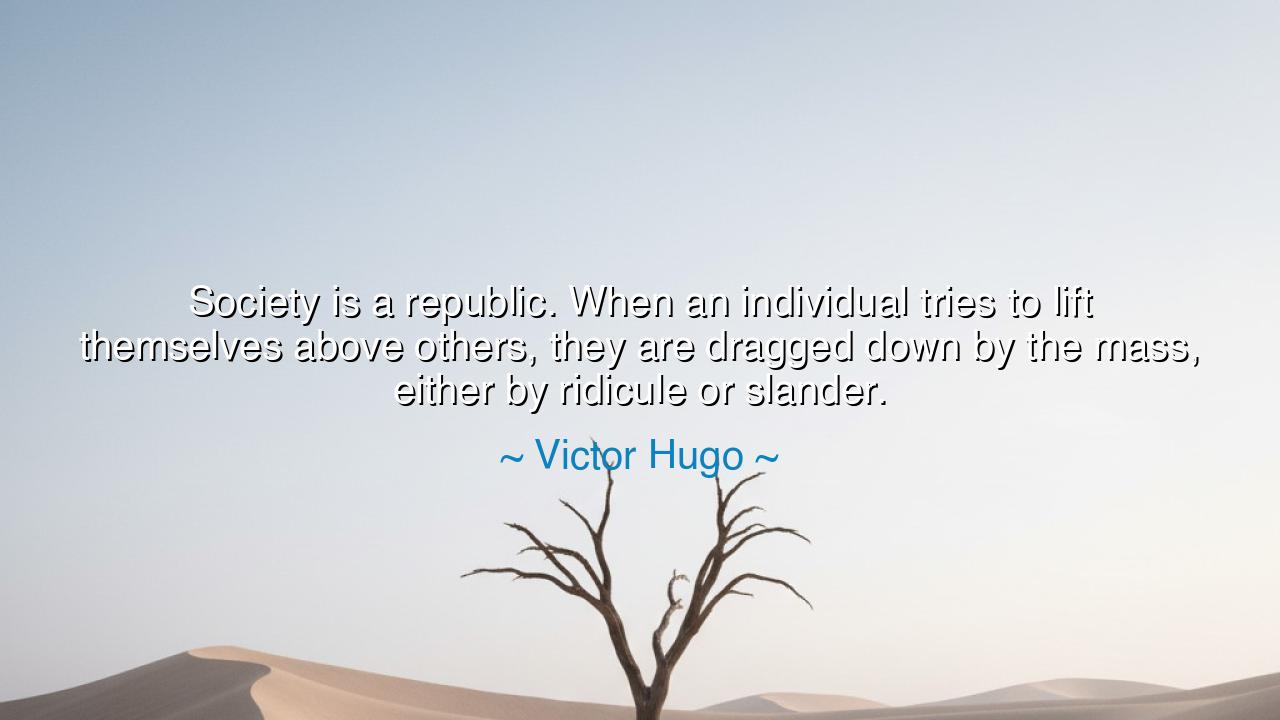
Society is a republic. When an individual tries to lift
Society is a republic. When an individual tries to lift themselves above others, they are dragged down by the mass, either by ridicule or slander.






Hear, O seeker of wisdom, the words of Victor Hugo, the poet of liberty and the prophet of human dignity: “Society is a republic. When an individual tries to lift themselves above others, they are dragged down by the mass, either by ridicule or slander.” These words unveil the paradox of human community. For though men are bound together in fellowship, they also guard against those who rise too high, fearing that one voice exalted will silence the chorus of many. Thus, society behaves as a republic of equals, cutting down those who appear to tower above, often not with justice but with mockery, not with reason but with malice.
What does Hugo mean by calling society a republic? He does not speak only of governments or constitutions. He speaks of the spirit of mankind living together, where each demands recognition, and none wish to be overshadowed. In such a world, any man or woman who rises with brilliance, with power, with originality, risks the resentment of the many. Instead of being celebrated, they are often met with ridicule to humble them, or slander to poison their name. Thus society protects its equality, but often at the cost of greatness.
Consider the tale of Socrates, the philosopher of Athens. He sought truth above comfort, wisdom above flattery, and dared to question the false certainties of his fellow citizens. Yet Athens, that cradle of democracy, could not endure a man who lifted himself above the common understanding. The mass dragged him down, not with swords but with accusation, branding him corrupter of youth and enemy of the gods. In their fear of one man’s towering insight, they gave him hemlock, silencing his voice forever.
Think too of Galileo Galilei, who raised his eyes to the heavens and proclaimed that the earth moved around the sun. He did not seek to destroy faith, but to expand knowledge. Yet his brilliance, lifting him above the horizon of common thought, drew forth not celebration but slander. The authorities, fearing his solitary voice, condemned him. He was forced to kneel, to deny his truth, to cloak his flame beneath the bushel of obedience. Here too, the republic of society struck down the individual who dared to rise too high.
Yet let us not despair at Hugo’s words. For though society may drag down with mockery those who soar, still the legacy of such souls cannot be buried. The laughter of the crowd fades, the venom of slander dries, but the truth of the courageous endures. Socrates lives in every philosopher’s question, Galileo in every telescope raised to the stars. Their fate teaches us that to rise above the mass is dangerous, yet necessary—for it is from such lives that humanity takes its greatest steps forward.
The lesson, then, is twofold. First, let the aspiring soul be prepared: if you seek to stand above, expect ridicule and slander. Do not let them destroy you, for they are the price paid for vision. Second, let society itself learn: do not despise those who shine brighter, but honor them, for their light illuminates the path of all. To drag them down in envy is to extinguish a lamp that might guide us through the darkness.
Therefore, O child of tomorrow, take Hugo’s wisdom into your heart. When you rise in courage, do not falter at the laughter of the crowd. And when you see another rise, do not meet them with envy, but with respect. For society is indeed a republic, but it need not be a republic of mediocrity. It can be a fellowship where the greatness of one becomes the treasure of all. Only then shall we live not in fear of the tall tree, but in joy that its branches give us shade.






AAdministratorAdministrator
Welcome, honored guests. Please leave a comment, we will respond soon